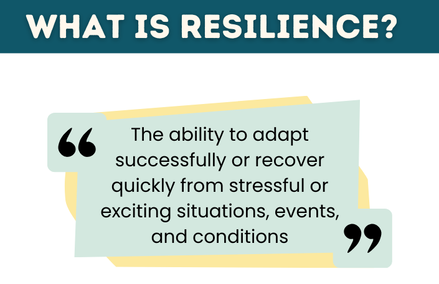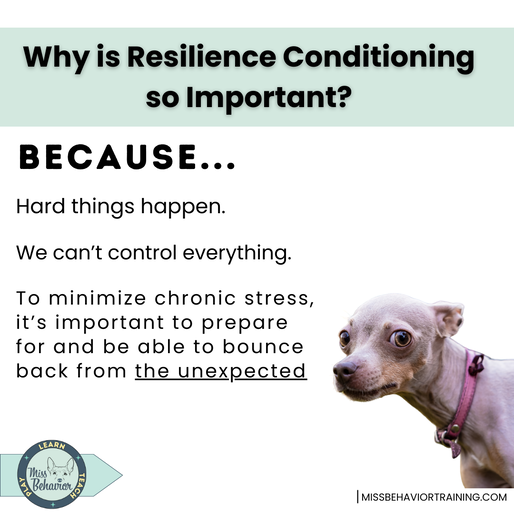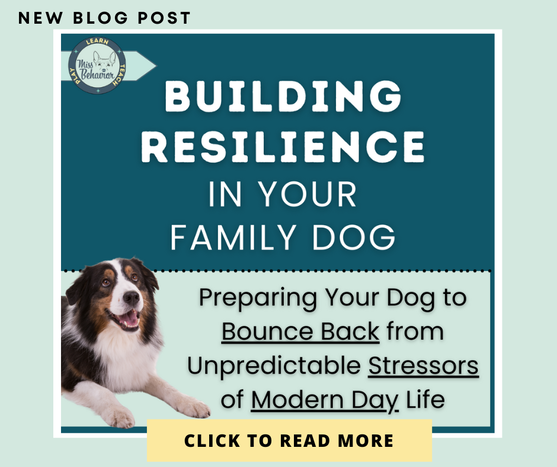 Resilience is the ability to adapt successfully or recover quickly from stressful or exciting situations, events, or conditions. Just like us, dogs face various stressors and changes, from loud noises and unfamiliar environments to health issues and training difficulties. A resilient dog can handle and navigate these obstacles with confidence and ease, maintaining their well-being and happiness along the way. Why does resilience matter in our family dogs? Because it directly impacts their overall quality of life and well-being. A resilient dog is better equipped to handle the ups and downs of life, the hard stuff life throws at them, even when we do our very best to keep them in a protective bubble. High resilience results in less stress, improved behavior, and a more trust with their people and the world around them. Understanding and building your dog's resilience can also help you moderate their environment, behavior plans, and care to better support their emotional and behavioral needs. Why is resilience conditioning important? To preparation for life's challenges: Just like people, dogs encounter various challenges throughout their lives, from changes in their environment to unexpected events. By be pro-active in resilience conditioning exercises, dogs can develop the necessary skills to cope with these challenges more effectively and with less acute or chronic stress. To prepare for the unpredictability of life: Life is unpredictable, and dogs are often exposed to situations beyond their control, as much as we try to protect them and keep it from happening. Whether it's loud noises, unfamiliar environments, or sudden changes in routine, resilience conditioning helps dogs adapt to these unpredictable circumstances in a more general way. We can't prepare for everything so rather than feeling like we need to walk our dogs through conditioning to them to every little trigger they may encounter, we can create more flexibility and resilience in them to handle the unexpected. To minimization chronic stress: Chronic stress can have detrimental effects on a dog's physical and mental well-being. By proactively training for resilience, dogs learn to manage individual stressors more efficiently, reducing the likelihood of more chronic or long-term issues. To achieve better mental health: Just as physical exercise is essential for a dog's physical health, resilience conditioning is crucial for their mental health. It strengthens their psychological resilience, enabling them to bounce back from thos eunexpected setbacks and learn how to complete their stress cycle. Building trust: Pro-actively engaging in resilience conditioning activities, such as training exercises and proper socialization, fosters a strong bond of trust between dogs and their people. This serves as a foundation of social support during challenging times, further enhancing the dog's resilience. How to get startedAs Dr Kathy Murphy and Bobbie Bhambree so eloquently outline in their Resilience Rainbow model, there are 7 domains of focus when conditioning resilience:
Within each of those domains are games and skills that can be taught and focused on in order to condition resilience. Many skills actually live within multiple domains, which is a nice perk for those who don't have all day, every day to work on this with their dogs (insert winking face here). The good news is that no matter what age, breed, or level or resilience your dog is currently at, there is always room for improvement and growth. Wondering how resilient your dog is now? Head over to take the 10 question quiz to give you insight on that very question! Ready to get started in conditioning your dog's resilience?Join the brand new course where I break down a pre-recorded webinar into bite-sized pieces to digest and refer back to whenever you need to. That's a great place to start! 
0 Comments
Your comment will be posted after it is approved.
Leave a Reply. |
|
- Home
- About
- Blog
- Services
- Membership
-
Courses & Freebies
- All Courses
- FREE Boredom Buster Recipes
- COURSE: Building Resilience in your Family Dog
- COURSE: Managing the Leash Walk
- Potty Training COURSE
- Paws Off COURSE
- COURSE: Managing the Leash Walk
- FREE Attention Building Challenge
- FREE Scratchboard Training
- FREE Rest and Recovery Round-Up
- FREE Body Language 101
- Contact
- Home
- About
- Blog
- Services
- Membership
-
Courses & Freebies
- All Courses
- FREE Boredom Buster Recipes
- COURSE: Building Resilience in your Family Dog
- COURSE: Managing the Leash Walk
- Potty Training COURSE
- Paws Off COURSE
- COURSE: Managing the Leash Walk
- FREE Attention Building Challenge
- FREE Scratchboard Training
- FREE Rest and Recovery Round-Up
- FREE Body Language 101
- Contact
Search by typing & pressing enter



 RSS Feed
RSS Feed





